Understanding ADHD and the Quest for Natural Support
Attention Deficit Hyperactivity Disorder (ADHD) is a complex neurodevelopmental condition that impacts millions of children, adolescents, and adults worldwide. Characterized by patterns of inattention, impulsivity, and hyperactivity, ADHD can affect academic achievement, workplace productivity, relationships, and overall quality of life. While pharmaceutical interventions remain a cornerstone of treatment, a growing number of individuals seek complementary natural approaches to support focus, cognitive health, and emotional well-being. This quest for holistic methods has fueled intense interest in herbs, dietary strategies, and lifestyle interventions aimed at nurturing the brain without the potential side effects of conventional medications.
You may also like: Where to Buy Bacopa Monnieri: How to Find Quality Supplements for Cognitive and Memory Support
One crucial aspect often overlooked in discussions about ADHD management is the role of brain nutrition. Researchers have long recognized that certain foods can influence neurotransmitter activity, support the temporal lobe—a brain region essential for memory and emotional regulation—and promote sustained attention. Thus, integrating “temporal lobe food” into daily routines, alongside targeted herbal supplementation, may offer promising avenues for enhancing cognitive clarity naturally. As we embark on a detailed exploration of the best herbs for ADHD, it is essential to approach the topic with scientific rigor, medical accuracy, and an emphasis on safe, evidence-based practices.
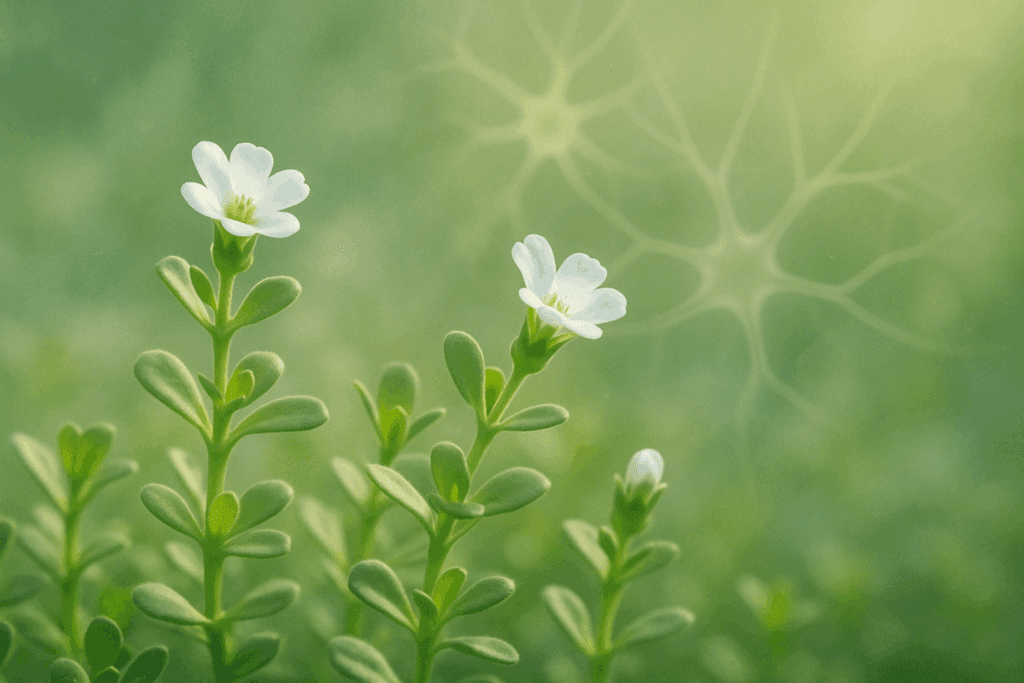
The Role of the Temporal Lobe in Attention and Cognitive Function
The temporal lobe is a key structure within the brain’s cerebral cortex, playing a vital role in auditory processing, language comprehension, memory formation, and emotional regulation. Impairments or dysregulation within the temporal lobe have been implicated in various neuropsychiatric conditions, including ADHD. Given its central importance, researchers have begun exploring how specific nutrients and botanicals, often classified as “temporal lobe food,” may influence temporal lobe health and overall cognitive performance.
Foods rich in omega-3 fatty acids, antioxidants, and polyphenols are considered particularly beneficial for the temporal lobe. Diets high in these nutrients can reduce inflammation, support neuronal integrity, and enhance synaptic plasticity, which are essential processes for sustaining attention and learning. Herbs that modulate neurotransmitter activity or offer neuroprotective benefits may further amplify these effects, creating a synergistic environment for optimal brain function. By understanding the intimate relationship between diet, botanicals, and temporal lobe function, individuals with ADHD can adopt more comprehensive strategies for cognitive support.
Are Beans Good for Your Brain? The Underrated Power of Legumes
When discussing brain-friendly nutrition, beans often remain overlooked compared to more glamorous superfoods. Yet, scientific evidence underscores the profound cognitive benefits of legumes. Answering the question “are beans good for your brain” with a resounding yes, researchers highlight several mechanisms by which beans bolster neurological health.
Beans are abundant in complex carbohydrates, providing a steady release of glucose—the brain’s preferred energy source. Unlike simple sugars that cause rapid spikes and crashes, the slow-digesting nature of beans helps maintain consistent mental energy throughout the day, an essential factor for individuals managing ADHD symptoms. Moreover, beans are rich in B vitamins, magnesium, zinc, and iron, all of which contribute to neurotransmitter synthesis and function. B vitamins, in particular, are crucial for the production of dopamine and serotonin, two neurotransmitters intimately involved in attention, mood regulation, and impulse control.
Additionally, beans are a valuable source of plant-based protein and fiber, promoting balanced blood sugar levels and supporting gut health. Emerging research into the gut-brain axis suggests that a healthy gut microbiome can influence cognitive processes and emotional stability, highlighting yet another reason why beans deserve a prominent place in any brain-supportive diet.
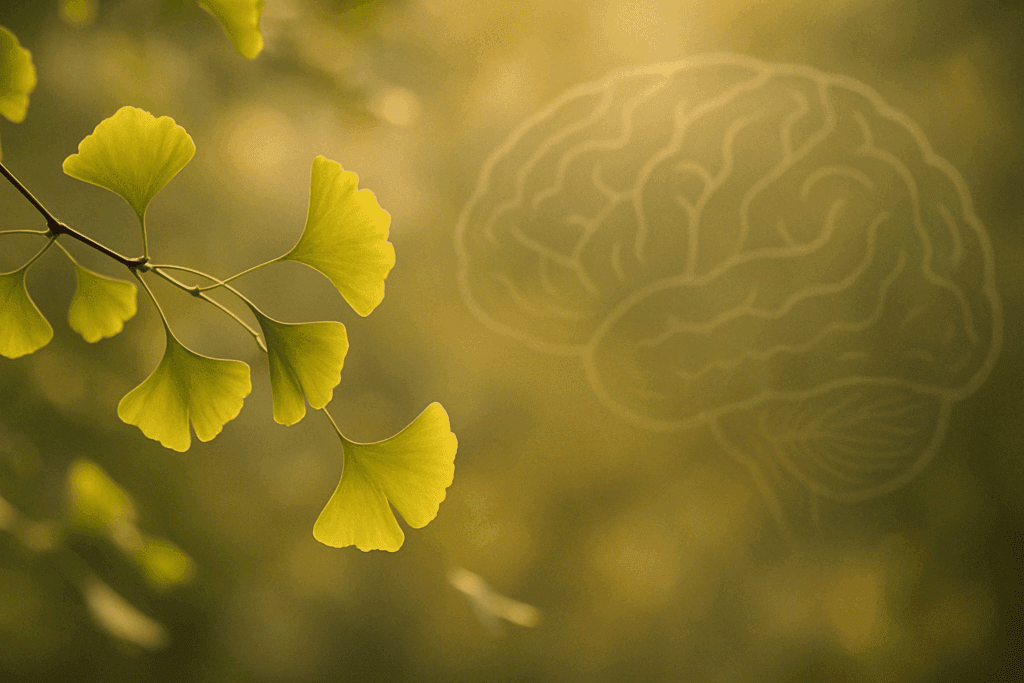
Ginkgo Biloba: A Timeless Ally for Cognitive Support
Among the best-known herbs studied for cognitive enhancement, Ginkgo biloba stands out for its long history of medicinal use. Extracts from the leaves of the Ginkgo tree contain potent flavonoids and terpenoids, compounds renowned for their antioxidant and anti-inflammatory properties. Ginkgo biloba is particularly esteemed for its ability to enhance cerebral blood flow, thereby improving the delivery of oxygen and nutrients to brain tissues.
In the context of ADHD, Ginkgo biloba has attracted scientific attention for its potential to support working memory, mental processing speed, and attentional control. Some clinical studies have suggested that Ginkgo supplementation may modestly improve symptoms of hyperactivity and impulsivity, particularly when combined with conventional treatments. As a form of “temporal lobe food,” Ginkgo’s vascular benefits may specifically nourish brain regions integral to focus and emotional regulation.
Nevertheless, it is critical to approach Ginkgo biloba supplementation with caution, especially for individuals taking blood thinners or those with bleeding disorders. Consulting a healthcare provider before initiating any herbal regimen is a fundamental aspect of responsible, medically sound practice.
Bacopa Monnieri: Ancient Wisdom for Modern Cognitive Challenges
Bacopa monnieri, also known as Brahmi, is a revered herb in traditional Ayurvedic medicine, celebrated for its adaptogenic and nootropic properties. Modern scientific investigations have validated many of Bacopa’s traditional uses, demonstrating its capacity to enhance memory, learning, and information retention. Rich in bacosides, unique phytochemicals that support synaptic communication and neuronal resilience, Bacopa represents a promising natural adjunct for ADHD management.
Preliminary research suggests that Bacopa may improve attention span and reduce symptoms of restlessness and impulsivity in children and adults with ADHD. Its neuroprotective effects extend to the temporal lobe, where it helps mitigate oxidative stress and promote synaptic plasticity—key factors for sustaining focus and emotional stability. Unlike stimulants that offer rapid but transient symptom relief, Bacopa’s benefits tend to accumulate gradually over weeks of consistent use, reflecting its holistic influence on cognitive function.
Moreover, Bacopa monnieri’s antioxidant properties align with the broader goal of consuming “temporal lobe food” to fortify brain health. By incorporating Bacopa into a comprehensive cognitive support strategy that includes nutrient-dense foods such as beans, individuals with ADHD may experience synergistic improvements in mental clarity and resilience.
Rhodiola Rosea: Building Stress Resilience for Sharper Focus
Stress is a pervasive and often overlooked trigger that can exacerbate ADHD symptoms. Difficulty managing stress can lead to heightened impulsivity, poor decision-making, and emotional dysregulation. Rhodiola rosea, a renowned adaptogen native to cold, mountainous regions of Europe and Asia, offers a natural solution for bolstering stress resilience and cognitive endurance.
Compounds within Rhodiola, particularly rosavins and salidrosides, have been shown to modulate the hypothalamic-pituitary-adrenal (HPA) axis, the body’s central stress response system. By balancing cortisol levels and enhancing mitochondrial energy production, Rhodiola can support sustained mental energy, sharper focus, and greater emotional stability. These effects make Rhodiola a compelling option for individuals seeking natural adjuncts to ADHD management.
Although Rhodiola is not a direct substitute for “temporal lobe food,” its ability to reduce stress-induced cognitive impairments complements the broader goal of supporting brain health holistically. When combined with a diet rich in brain-nourishing foods like beans, Rhodiola may contribute to a more stable cognitive foundation for individuals with ADHD.
Panax Ginseng: Energizing the Mind and Enhancing Attention
Panax ginseng, sometimes referred to as “true ginseng,” has been used for centuries to promote vitality, endurance, and mental acuity. Modern research attributes these benefits to ginsenosides, bioactive compounds that influence neurotransmitter function, neuroplasticity, and oxidative balance.
In the context of ADHD, Panax ginseng shows promise for improving attention span, working memory, and executive functioning. Some studies have reported improvements in impulsivity and hyperactivity, suggesting that ginseng’s multifaceted actions on the central nervous system may offer meaningful support for individuals managing ADHD symptoms. Ginseng’s potential to regulate dopamine and norepinephrine pathways—both implicated in ADHD—adds further credibility to its use as part of a natural cognitive support strategy.
While Panax ginseng is not classified strictly as “temporal lobe food,” its ability to enhance cerebral perfusion and reduce oxidative damage indirectly supports brain regions critical for focus and self-regulation. As with any botanical intervention, careful consideration of dosage, source quality, and potential interactions with medications is essential for safe and effective use.
Exploring Other Promising Herbs for ADHD Support
In addition to the well-established herbs discussed, several other botanicals have emerged as potential allies for ADHD management. Gotu kola (Centella asiatica), known for its cognitive-enhancing and neuroprotective properties, has been traditionally used to promote mental clarity and emotional balance. Similarly, Lemon balm (Melissa officinalis) has demonstrated anxiolytic effects that may reduce stress-induced attentional impairments.
Another noteworthy contender is Valerian root (Valeriana officinalis), commonly used to improve sleep quality. Given the bidirectional relationship between sleep and cognitive performance, supporting restful sleep with calming herbs may indirectly enhance attention and impulse control in individuals with ADHD. Although these herbs are not primary sources of “temporal lobe food,” they can form valuable components of a comprehensive natural strategy when used thoughtfully and under professional guidance.
When considering dietary interventions, revisiting the question “are beans good for your brain” reinforces the value of incorporating nutrient-dense, fiber-rich legumes into daily meals. Beans offer a foundational platform of nutritional support that complements the targeted benefits of herbal supplements.
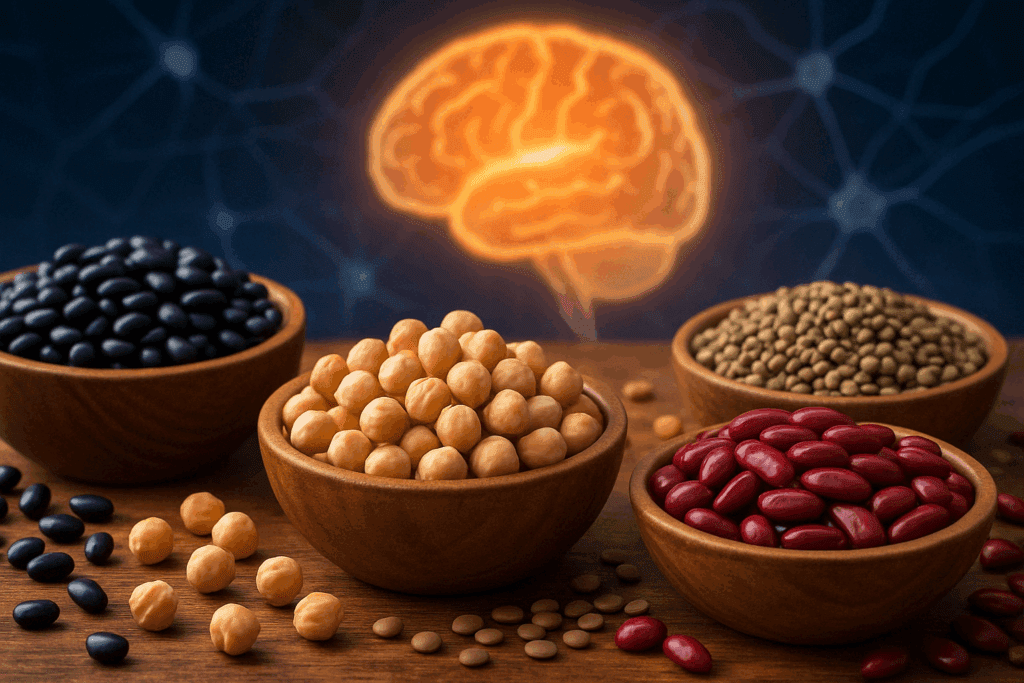
Crafting a Brain-Supportive Lifestyle: Diet, Herbs, and Beyond
Effectively managing ADHD through natural means requires more than isolated interventions. A synergistic approach that combines strategic dietary choices, herbal supplementation, physical activity, mindfulness practices, and proper sleep hygiene offers the greatest potential for success. Consuming foods classified as “temporal lobe food,” such as omega-3-rich fish, berries, leafy greens, nuts, and yes, beans, provides essential building blocks for optimal brain function.
Addressing the broader question of “are beans good for your brain” within this lifestyle context reveals that beans not only offer immediate nutritional benefits but also support long-term cognitive resilience through gut health, blood sugar regulation, and neurotransmitter synthesis. Integrating herbs like Bacopa, Ginkgo, and Rhodiola into a well-rounded routine further enhances these effects, creating a dynamic and adaptive environment for brain health.
Beyond diet and supplementation, engaging in regular aerobic exercise has been shown to enhance executive functioning and increase dopamine availability—critical factors for ADHD management. Practices such as yoga, meditation, and deep-breathing exercises can further reduce stress, improve emotional regulation, and cultivate sustained attention, reinforcing the gains achieved through nutritional and herbal interventions.
The Importance of Professional Guidance and Individualization
While the allure of natural remedies is strong, it is imperative to approach ADHD management with professional oversight and individualized planning. Herbs and supplements can interact with prescription medications, influence metabolic pathways, and produce side effects if used improperly. Consulting with healthcare providers, including integrative medicine specialists or functional nutritionists, ensures that interventions are tailored to the individual’s unique biochemistry, symptom profile, and lifestyle needs.
Moreover, not all herbs are suitable for every individual. Factors such as age, gender, comorbid conditions, and genetic polymorphisms can influence how a person responds to specific botanical agents. A thoughtful, personalized approach respects these nuances and maximizes the potential benefits of natural strategies for cognitive support.
Ultimately, the goal of exploring the best herb for ADHD is not to replace evidence-based medical treatments but to enrich the therapeutic landscape with safe, effective, and empowering options that honor the complexity of human cognition and well-being.
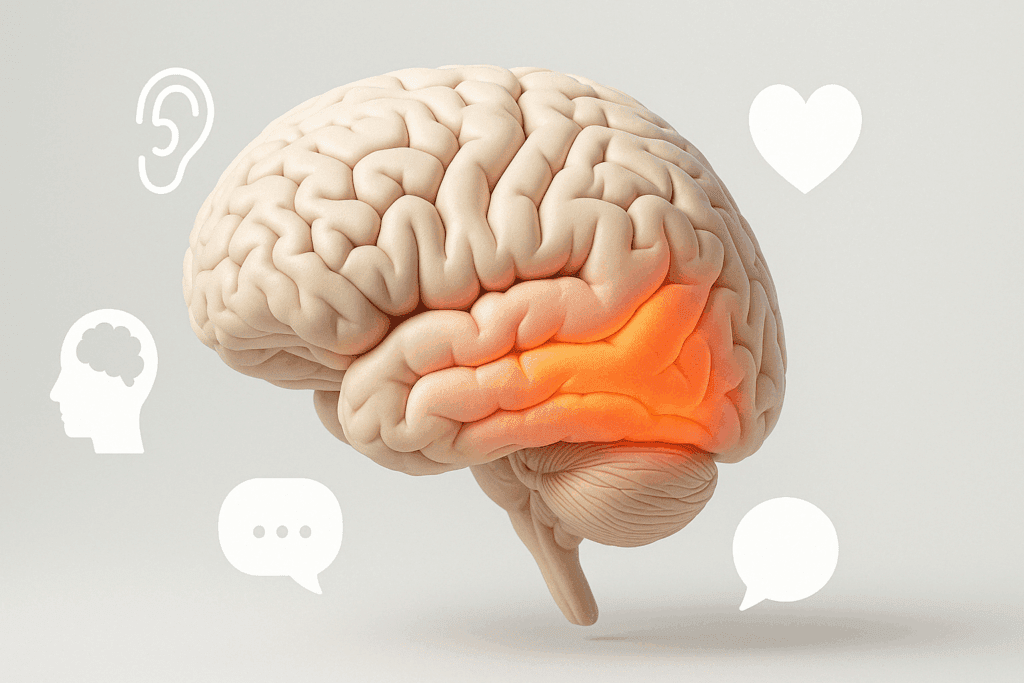
FAQ: Advanced Insights into Nutrition, Brain Health, and Cognitive Enhancement
1. How does nutrition specifically impact the temporal lobe and its functions?
The temporal lobe plays a critical role in memory, language, and emotional regulation. Emerging research shows that targeted “temporal lobe food”—such as antioxidant-rich berries, omega-3 fatty acids, and flavonoid-packed vegetables—can significantly influence this brain region’s health. Foods promoting neurogenesis and synaptic plasticity help strengthen the temporal lobe’s resilience against age-related decline. In addition, lifestyle factors like meal timing and glycemic load directly affect neuronal efficiency within this area. For anyone looking to optimize long-term memory and emotional stability, incorporating high-quality temporal lobe food consistently into their diet is a science-backed strategy.
2. Are beans good for your brain in supporting long-term memory formation?
Absolutely—multiple studies have shown that beans are more than just a protein source; they are deeply involved in brain health. Rich in folate, magnesium, and antioxidants, beans help support hippocampal and temporal lobe activity. When asking “are beans good for your brain?” it’s important to understand they promote steady glucose delivery, essential for memory consolidation. Including beans several times a week can thus indirectly enhance the brain’s ability to store and retrieve information. Their fiber content also benefits gut health, creating a positive feedback loop known as the gut-brain axis.
3. What are some overlooked types of temporal lobe food that aren’t widely discussed?
Beyond well-known brain foods like salmon and blueberries, lesser-known temporal lobe food sources include pumpkin seeds, beets, and even fermented foods like kimchi. These foods offer nitrates, probiotics, and essential micronutrients that uniquely support blood flow and neurotransmitter balance. For instance, nitrates from beets can enhance oxygen delivery to the temporal lobe, boosting verbal memory and auditory processing. Integrating a variety of temporal lobe food options can provide more comprehensive cognitive support than sticking to just a few staples. Diversity, not just nutrient density, is key for optimal temporal lobe function.
4. Are beans good for your brain when it comes to preventing cognitive decline with age?
Yes, and recent longitudinal studies back this up. Beans contain high levels of polyphenols, compounds known to reduce neuroinflammation—a key player in cognitive aging. Asking “are beans good for your brain” isn’t just about boosting short-term focus; it’s also about longevity. Regular bean consumption has been correlated with slower rates of memory decline and better executive function in older adults. Their combination of fiber, protein, and micronutrients provides a steady nutrient base that protects neurons against oxidative damage.
5. How does eating for the temporal lobe differ from eating for other parts of the brain?
While the whole brain benefits from balanced nutrition, the temporal lobe requires specific support for tasks like language comprehension and episodic memory. Tailored temporal lobe food choices, like foods rich in choline (e.g., eggs) and polyunsaturated fats, are crucial for maintaining synaptic plasticity in this region. Unlike the prefrontal cortex, which thrives on fast-acting glucose sources for decision-making, the temporal lobe demands long-term nutritional investments. Sustained intake of high-antioxidant foods and anti-inflammatory compounds is essential for temporal lobe durability. Precision nutrition can thus be customized depending on which cognitive skills one wishes to enhance.
6. In what ways are beans good for your brain beyond their nutritional profile?
Interestingly, beans support brain health not just through nutrients but also by influencing circadian rhythms. The high magnesium content in beans helps regulate sleep quality, which is vital for memory consolidation occurring mainly in the temporal lobe during deep sleep stages. When exploring “are beans good for your brain,” it’s worth considering their role in promoting consistent, restorative sleep patterns. Better sleep means more efficient cognitive processing the next day. Additionally, beans’ impact on gut microbiota can enhance mood and cognitive flexibility—an emerging field known as nutritional psychiatry.
7. Can eating temporal lobe food actually change brain structure over time?
Yes, certain studies using MRI imaging have demonstrated that consistent intake of temporal lobe food can lead to detectable changes in brain volume and density. Foods like walnuts, avocados, and dark leafy greens not only protect neurons but may actually encourage neurogenesis in the temporal lobe. While genetics certainly play a role in brain structure, lifestyle and nutrition can actively shape brain plasticity well into adulthood. Following a temporal lobe food-centered diet over months or years could yield tangible, positive structural changes. This offers exciting hope for dietary interventions in early cognitive decline.
8. How do cooking methods influence whether beans are good for your brain?
Preparation methods make a big difference. Simply asking “are beans good for your brain” is not enough—how you cook them matters, too. Pressure cooking, soaking, and sprouting beans can reduce anti-nutrients like lectins and phytates, making key minerals more bioavailable for cognitive health. Overcooking beans, on the other hand, may degrade vital vitamins like folate, diminishing their brain-boosting benefits. Optimal preparation preserves the nutritional integrity that supports neurotransmitter production, memory retention, and emotional regulation.
9. What emerging research connects temporal lobe food with mental health?
Recent studies have linked temporal lobe food choices with lower rates of anxiety and depression, conditions closely tied to temporal lobe function. Specific foods—like turmeric, cacao, and fermented products—help modulate brain-derived neurotrophic factor (BDNF), a protein essential for mood regulation and cognitive flexibility. Adding more targeted temporal lobe food into one’s diet may thus offer natural adjunct support for mental health therapies. While more large-scale trials are needed, preliminary data are extremely promising. Nutrition could soon play a formalized role in psychiatric care models, especially for temporal lobe-related mood disorders.
10. Are beans good for your brain when considering mental endurance and focus?
Beans offer one of the best plant-based sources of sustained energy, crucial for mental endurance. Asking “are beans good for your brain” highlights their ability to prevent mid-day cognitive crashes, thanks to their slow-digesting carbohydrates. Unlike simple sugars that cause spikes and crashes in blood glucose, beans stabilize energy levels, maintaining focus and clarity for longer periods. Their iron content also supports oxygen delivery to the brain, enhancing both endurance and cognitive sharpness. Incorporating beans into pre-exam or high-stress days can thus be a strategic move for students, professionals, and creatives alike.
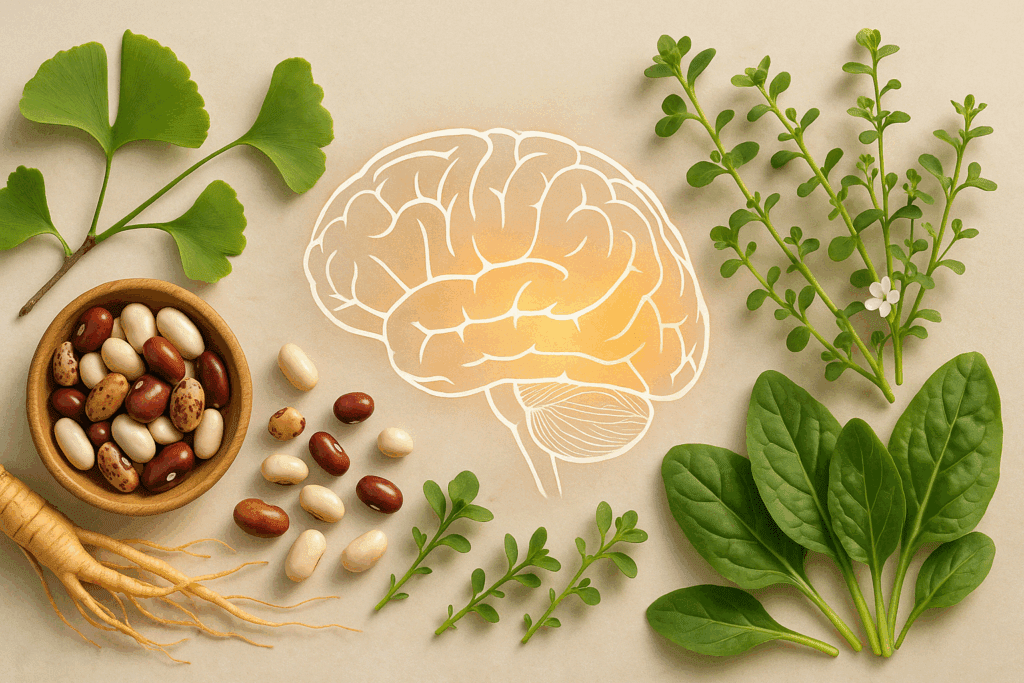
Reflections on Natural ADHD Support: A Holistic Perspective on Brain Health
In seeking natural approaches to support ADHD management, it becomes evident that no single herb, food, or practice offers a universal solution. Instead, the journey toward sharper focus, emotional balance, and cognitive vitality requires an integrated tapestry of strategies woven together with care and intentionality. Emphasizing “temporal lobe food” in daily nutrition, recognizing the cognitive value of humble foods like beans, and thoughtfully incorporating herbs such as Ginkgo biloba, Bacopa monnieri, and Rhodiola rosea form a potent foundation for holistic brain support.
Answering the question “are beans good for your brain” within this broader narrative affirms their rightful place as a simple yet powerful ally in cognitive health. Their synergy with targeted botanicals and lifestyle practices exemplifies the profound impact that natural interventions can have when approached with respect for scientific evidence, individual diversity, and the intricate beauty of the human brain.
As research into neurodevelopmental conditions like ADHD continues to evolve, so too will our understanding of how best to harness nature’s gifts for cognitive support. By remaining grounded in medical accuracy, scientific inquiry, and compassionate self-care, individuals navigating ADHD can cultivate greater clarity, resilience, and empowerment—one mindful choice at a time.
Was this article helpful? Don’t let it stop with you. Share it right now with someone who needs to see it—whether it’s a friend, a colleague, or your whole network. And if staying ahead on this topic matters to you, subscribe to this publication for the most up-to-date information. You’ll get the latest insights delivered straight to you—no searching, no missing out.
Further Reading:
9 Natural Remedies to Support ADHD Treatment
The Top 5 Natural Remedies for ADHD
Important Note: The information contained in this article is for general informational purposes only, and should not be construed as health or medical advice, nor is it intended to diagnose, prevent, treat, or cure any disease or health condition. Before embarking on any diet, fitness regimen, or program of nutritional supplementation, it is advisable to consult your healthcare professional in order to determine its safety and probable efficacy in terms of your individual state of health.
Regarding Nutritional Supplements Or Other Non-Prescription Health Products: If any nutritional supplements or other non-prescription health products are mentioned in the foregoing article, any claims or statements made about them have not been evaluated by the U.S. Food and Drug Administration, and such nutritional supplements or other health products are not intended to diagnose, treat, cure, or prevent any disease.


